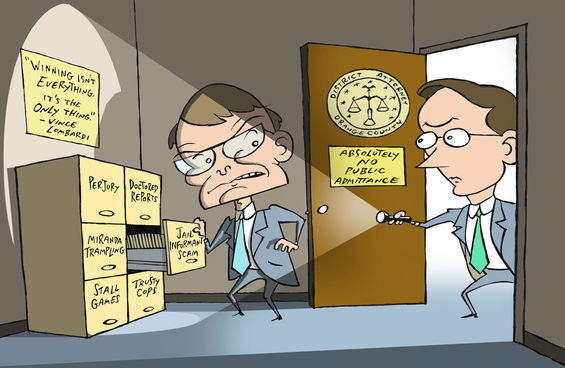25 Feb OCDA Says You Have the Right to Self-Incrimination
By R. SCOTT MOXLEY , OC Weekly
Despite competing tasks, Orange County prosecutors and public defenders routinely engage in cordial backslapping. They’ll chat about their personal lives, tell jokes and share lawyerly gossip during court breaks. Defendants sometimes wonder if that coziness means the trial that left them convicted wasn’t genuinely adversarial.
But a huge, bitter rift over alleged “unconscionable” prosecutorial cheating recently shattered that comradery. At open court sessions this month in two, high-profile homicide cases, hostilities erupted between once-friendly lawyers. Voices were raised and fingers pointed. As punctuation to assurances this war has only just begun, one of the parties slammed a stack of documents on a wooden courtroom table.
Assistant Public Defender Scott Sanders fired the opening salvo on Feb. 7 when he filed an explosive 505-page motion claiming his investigation uncovered “compelling evidence of shocking misconduct” by local law enforcement. The alleged corruption involves a systematic effort to violate the rights of pretrial, arraigned defendants who’ve invoked their constitutional right to not answer government questions, especially without the presence of a defense lawyer. According to Sanders, homicide and gang prosecutors working with police detectives and sheriff’s jail deputies have repeatedly circumvented the law by employing in-custody informants who befriend unsuspecting targeted defendants and ask probing questions.
“There has been a systematic effort to violate the 6th Amendment,” said Sanders, who represents Daniel Wozniak and Scott Dekraai, both of whom have admitted guilt but hope to avoid the death penalty.
Criminal defense attorney Kenneth A. Reed is paying attention to Sanders’ accusations. Santa Ana Police Department (SAPD) cops arrested Vanesa Zavala, one of Reed’s clients, for the Jan. 19 beating death of Kim Pham. Invoking her constitutional rights, Zavala refused to answer questions and requested legal counsel. SAPD nonetheless sent an undercover cop into her cell to trick her into talking. The tactic alarms Reed, but Brian Gurwitz—a former OC prosecutor now in private practice—says California courts allow cops to deceive arrestees. “The public may be startled to learn that Miranda protections don’t apply when someone thinks he or she is talking to a fellow inmate. Until the arraignment, the police can ignore the suspect’s refusal to speak to them by using a fake inmate to ask questions.”
But there’s no doubt arraigned defendants are shielded from such duplicity, according to Sanders, who says he discovered prosecutors violated this protection while studying thousands of pages of documents and listening to hours of surreptitious jail recordings prosecutors strenuously fought to keep secret but ultimately surrendered after a judge ordered their release.
“The court-ordered discovery reveals investigatory and discovery practices by [fusion_builder_container hundred_percent=”yes” overflow=”visible”][fusion_builder_row][fusion_builder_column type=”1_1″ background_position=”left top” background_color=”” border_size=”” border_color=”” border_style=”solid” spacing=”yes” background_image=”” background_repeat=”no-repeat” padding=”” margin_top=”0px” margin_bottom=”0px” class=”” id=”” animation_type=”” animation_speed=”0.3″ animation_direction=”left” hide_on_mobile=”no” center_content=”no” min_height=”none”][prosecutors] that are rooted in deception and concealment; an unchecked and lawless custodial informant program overseen by the Orange County district attorney’s office (OCDA); and a string of prosecutions which confirm a culture that confuses winning with justice—prosecutions marked by repeated and stunning Brady violations, suborned perjury and a myriad of other misconduct,” Sanders told Superior Court Judge Thomas M. Goethals. “Scary stuff is going on in Orange County courthouses.”
(In the Brady case, the U.S. Supreme Court ruled it is unlawful for prosecutors to hide evidence favorable to a defendant.)
Sanders singled out Dan Wagner, head of the DA’s homicide unit and the prosecutor in the Dekraai case, for “terribly troubling and unethical” conduct. He says in his motion that Wagner actively engaged in plots to encourage Dekraai to unwittingly reveal defense strategies for the upcoming March 24 trial, managed document hiding, shielded notoriously unreliable informants from scrutiny, and helped to craft the false story that these informants acted without government prodding or enticements.
Wagner denies any wrongdoing and has contemptuously labeled the accusations as scandalous.
Matt Murphy, Wagner’s DA colleague who is handling the Wozniak case, also took issue with Sanders’ complaints that the OCDA used the informant known as “Inmate F”—a despicable Mexican Mafia, career criminal—to trick that defendant into talking. Murphy equally denies a role by his office in an MSNBC Lock Up broadcast that featured Wozniak speaking confidently in his cell without the knowledge of Sanders. It wasn’t his fault the public defender lacked “client control” and that Wozniak said “a bunch of stupid stuff,” the prosecutor said.
On Feb. 14, in front of Superior Court Judge James A. Stotler, Murphy declared there’s not “a scintilla” of evidence he participated in either controversy, and he prodded the public defender to prove his accusations. “Today’s the day to put up or shut up,” said a seething Murphy. “I didn’t talk to [MSNBC] before, during or after [their broadcast].”
Sanders called the prosecutor’s adamant denials “histrionics” and said he was ready to defend the content of his motion, a document with 20,000 pages of exhibits. But Stotler—who cringes when legal battles turn rancorous—declined Murphy’s request to settle the dispute during that pretrial hearing. “This issue isn’t on the calendar for today,” he reasoned.
As a remedy for the OCDA’s alleged “outrageous government conduct,” Sanders wants Wagner and Murphy barred from seeking the death penalty in either of his cases. Or, he wants what he sees as a more trustworthy California Attorney General’s office to replace the pair. His cause took bigger steps inside Goethals’ court. That judge, a former defense attorney and homicide prosecutor, said transparency and ethics are critical to the criminal-justice system. He unsealed the public defender’s brief that for a week had been blocked from public viewing at the request of Wagner.
“There has been a systematic effort to violate the 6th Amendment,” said Sanders, who represents Daniel Wozniak and Scott Dekraai, both of whom have admitted guilt but hope to avoid the death penalty.
Criminal defense attorney Kenneth A. Reed is paying attention to Sanders’ accusations. Santa Ana Police Department (SAPD) cops arrested Vanesa Zavala, one of Reed’s clients, for the Jan. 19 beating death of Kim Pham. Invoking her constitutional rights, Zavala refused to answer questions and requested legal counsel. SAPD nonetheless sent an undercover cop into her cell to trick her into talking. The tactic alarms Reed, but Brian Gurwitz—a former OC prosecutor now in private practice—says California courts allow cops to deceive arrestees. “The public may be startled to learn that Miranda protections don’t apply when someone thinks he or she is talking to a fellow inmate. Until the arraignment, the police can ignore the suspect’s refusal to speak to them by using a fake inmate to ask questions.”
But there’s no doubt arraigned defendants are shielded from such duplicity, according to Sanders, who says he discovered prosecutors violated this protection while studying thousands of pages of documents and listening to hours of surreptitious jail recordings prosecutors strenuously fought to keep secret but ultimately surrendered after a judge ordered their release.
“The court-ordered discovery reveals investigatory and discovery practices by [prosecutors] that are rooted in deception and concealment; an unchecked and lawless custodial informant program overseen by the Orange County district attorney’s office (OCDA); and a string of prosecutions which confirm a culture that confuses winning with justice—prosecutions marked by repeated and stunning Brady violations, suborned perjury and a myriad of other misconduct,” Sanders told Superior Court Judge Thomas M. Goethals. “Scary stuff is going on in Orange County courthouses.”
(In the Brady case, the U.S. Supreme Court ruled it is unlawful for prosecutors to hide evidence favorable to a defendant.)
Sanders singled out Dan Wagner, head of the DA’s homicide unit and the prosecutor in the Dekraai case, for “terribly troubling and unethical” conduct. He says in his motion that Wagner actively engaged in plots to encourage Dekraai to unwittingly reveal defense strategies for the upcoming March 24 trial, managed document hiding, shielded notoriously unreliable informants from scrutiny, and helped to craft the false story that these informants acted without government prodding or enticements.
Wagner denies any wrongdoing and has contemptuously labeled the accusations as scandalous.
Matt Murphy, Wagner’s DA colleague who is handling the Wozniak case, also took issue with Sanders’ complaints that the OCDA used the informant known as “Inmate F”—a despicable Mexican Mafia, career criminal—to trick that defendant into talking. Murphy equally denies a role by his office in an MSNBC Lock Up broadcast that featured Wozniak speaking confidently in his cell without the knowledge of Sanders. It wasn’t his fault the public defender lacked “client control” and that Wozniak said “a bunch of stupid stuff,” the prosecutor said.
On Feb. 14, in front of Superior Court Judge James A. Stotler, Murphy declared there’s not “a scintilla” of evidence he participated in either controversy, and he prodded the public defender to prove his accusations. “Today’s the day to put up or shut up,” said a seething Murphy. “I didn’t talk to [MSNBC] before, during or after [their broadcast].”
Sanders called the prosecutor’s adamant denials “histrionics” and said he was ready to defend the content of his motion, a document with 20,000 pages of exhibits. But Stotler—who cringes when legal battles turn rancorous—declined Murphy’s request to settle the dispute during that pretrial hearing. “This issue isn’t on the calendar for today,” he reasoned.
As a remedy for the OCDA’s alleged “outrageous government conduct,” Sanders wants Wagner and Murphy barred from seeking the death penalty in either of his cases. Or, he wants what he sees as a more trustworthy California Attorney General’s office to replace the pair. His cause took bigger steps inside Goethals’ court. That judge, a former defense attorney and homicide prosecutor, said transparency and ethics are critical to the criminal-justice system. He unsealed the public defender’s brief that for a week had been blocked from public viewing at the request of Wagner.[/fusion_builder_column][/fusion_builder_row][/fusion_builder_container]

